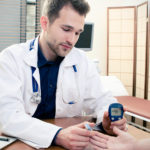By David Blyweiss, M.D., Advanced Natural Wellness
So often I find myself talking about prevention. And that can be a good thing.
After all, it’s important to do whatever you can to avoid chronic or catastrophic disease. But life doesn’t always work out that way. Despite our best efforts, sometimes we get sick, really sick. That’s when you need to shift gears.
Cancer is quite possibly the best example of this need.
Once you’ve gotten past the devastating diagnosis of cancer and treatment has begun, you may very well feel like you’re getting worse instead of better.
You may have no appetite. You may be in pain.
About one-third of people undergoing cancer treatment face acute or chronic pain. A cancerous tumor pressing on nerves, bones, or organs can create stabbing pain. Certain chemo drugs can trigger the “pins and needles” sensation of peripheral neuropathy. Chemo can also bring on headaches and mouth sores.
Some conventional medications help.
So can complementary approaches such as herbs, acupuncture, yoga and meditation. Put the two together and they may work even better so you can use your energy to heal, not fight off pain.
For peripheral neuropathy that is often a result of platinum-based chemo drugs, try the amino acid, L-glutamine.1
A tablespoon of honey, with its anti-inflammatory and antimicrobial properties, soothes mouth sores and helps prevent infection. And just drinking more water can help get rid of headaches.
The nausea, chronic acid reflux, vomiting, indigestion, painful eating and difficulty swallowing that often come with chemotherapy can be especially challenging.
While it might be tempting to eat whatever you can tolerate, you need to remember chemo requires the body to rebuild the cells lost during treatment. This means it’s important to stay away from processed foods like refined flours and sugar and instead focus on taking in protein and other easy-to-absorb, nutrient-dense foods since every calorie counts.2
The World's Quickest Solution for Ending Prostate and Urinary Misery
This has recently been revealed to be one of the only real breakthroughs in prostate health.
The seeds of a strange fruit (sometimes called "Chinese Apples") hold powerful phytonutrients that are a revolution in prostate health.
In fact, UCLA and Veterans Administration research have now proved this to be true.
Not only that, but it may be the worlds quickest solution for ending prostate misery.
Simply stated, these phytonutrients represent a huge step beyond beta sitosterol, saw palmetto, and other phytosterols alone.
Simply click HERE if you want to have fast prostate relief...restful, uninterrupted sleep...no more constant "urges to go"...enhanced virility...and optimal prostate support for life.
Nut butters, nuts, almond milk, kefir and whey isolate all provide good quality protein.
Small, frequent meals may help ward off nausea and bland foods are typically better tolerated than spicy food. Many cancer patients also report that eating cold or room temperature foods are easier to tolerate, especially if you have mouth sores.
Low-fiber foods help reduce diarrhea, another common chemo side effect.
If you have diarrhea, focus on foods containing potassium and sodium—minerals that may be lost—such as broth and potatoes without the skin. Drinking water with added electrolytes or coconut water can also help replace lost minerals.
Often, simply relaxing can lessen your pain.
Biofeedback reinforces awareness and control of your heart rate, breathing and muscle tension. Meditation calms as you focus on one thing while watching thoughts pass like clouds. Hypnosis opens you to the power of suggestion, supporting relaxation and the release of pain. One recent trial in the Journal of Clinical Nursing found that simply listening to music for 30 minutes reduces the anxiety many chemo patients experience.3
To help your doctor zero in on solutions to your side effects, monitor your pain—where and what it is, and what improves or worsens it. But remember, the last thing you want is something that makes you feel great, but interferes with your chemotherapy or radiation treatment.
That’s why it’s important to find a doctor who’s familiar with both natural remedies and conventional treatments for cancer. A doctor schooled in Traditional Chinese Medicine (TCM) and certified by the National Certification Commission for Acupuncture and Oriental Medicine will be familiar with Chinese herbs and how they
interact with Western cancer care.
If you visit a naturopath, choose one who understands conventional cancer treatments.
Bottom line: cancer is tough. But with the right tools and a supportive medical team by your side, you’ll not only be more likely to survive, you can actually thrive.
References:
- Wang WS. Oral Glutamine Is Effective for Preventing Oxaliplatin-Induced Neuropathy in Colorectal Cancer Patients. The Oncologist. 2007;12:312-319.
- Boukhettala N. A diet containing whey protein, glutamine, and TGFbeta modulates gut protein metabolism during chemotherapy-induced mucositis in rats. Digestive Diseases and Science. 2010;55:2172-2181.
- Lin MF. A randomised controlled trial of the effect of music therapy and verbal relaxation on chemotherapy-induced anxiety. Journal of Clinical Nursing. 2011;20:988-999.






